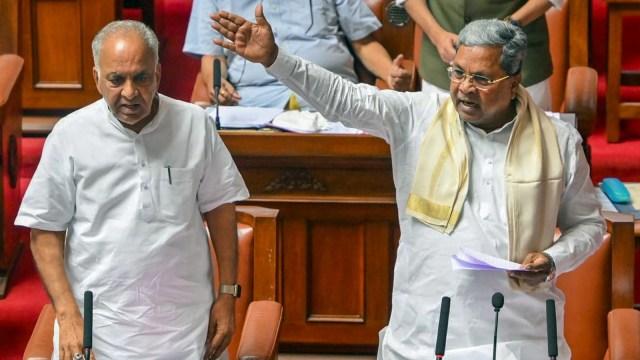Stay updated with the latest - Click here to follow us on Instagram
In setback for Congress, BJP-JDS Opposition defeats Karnataka temple management bill in Legislative Council
The bill which was opposed by the BJP since its introduction on February 19 and passage on February 22 in the state Assembly, where the Congress enjoys a clear majority, was defeated in the Legislative Council on Friday after it was put to vote by Deputy Chairman M K Pranesh even as the government proposed changes.
 The BJP-JDS combine has a clear majority in the 75-member council – the BJP has 34 members, Congress 30, JDS 8, 1 Independent, the chairman, plus one vacancy. The bill had earlier been passed by the Assembly where the Congress has 135 out of 224 members. (Photo: PTI)
The BJP-JDS combine has a clear majority in the 75-member council – the BJP has 34 members, Congress 30, JDS 8, 1 Independent, the chairman, plus one vacancy. The bill had earlier been passed by the Assembly where the Congress has 135 out of 224 members. (Photo: PTI)In a setback for the Congress, the combined BJP-JDS Opposition, which enjoys a majority in the Karnataka Legislative Council, defeated the Karnataka Hindu Religious Institutions and Charitable Endowments (Amendment) Bill, 2024 brought by the government to increase the common pool of funds for managing temples in the state.
The bill which was opposed by the BJP since its introduction on February 19 and passage on February 22 in the state Assembly, where the Congress enjoys a clear majority, was defeated in the Legislative Council on Friday after it was put to vote by Deputy Chairman M K Pranesh even as the government proposed changes.
The BJP-JDS combine has a clear majority in the 75-member council – the BJP has 34 members, Congress 30, JDS 8, 1 Independent, the chairman, plus one vacancy. The bill had earlier been passed by the Assembly where the Congress has 135 out of 224 members.
The Karnataka Hindu Religious Institutions and Charitable Endowments (Amendment) Act, 2024 essentially intends to “enhance the amount of common pool fund” available to the government for the upkeep of over 35,000 temples in the state and socio-religious work.
The bill intends to divert “ten per cent of the gross income in respect of institutions whose gross annual income exceeds rupees one crore” to a common pool fund for looking after temples instead of the existing “ten per cent of the net income of institutions whose gross annual income exceeds ten lakhs rupees”.
In addition, the amended law also dedicates “five per cent of the net income of institutions whose gross annual income exceeds ten lakhs rupees but does not exceed one crore rupees” to the common pool instead of the previous “five per cent of the net income of institutions whose gross annual income exceeds five lakhs rupees but does not exceed ten lakhs rupees”.
The changes in the law would generate an additional Rs 60 crore for the government from 87 temples with incomes of over Rs 1 crore and 311 temples with incomes in excess of Rs 10 lakh to manage the nearly 35,000 temples under the state Muzrai department.
BJP leader in the Legislative Council Kota Srinivas Poojary opposed the move to divert 10 per cent of the income of high-income temples to the common pool and the proposal to nominate presidents for temple committees instead of the temple committee electing their own presidents.
Muzrai Minister Ramalinga Reddy offered to bring changes to the bill by reconsidering the proposal to appoint the presidents for temple committees. However, Deputy Chairman Pranesh, who is from the BJP, rejected the offer saying that the bill that has been tabled must be taken up for consideration. He put the bill to vote even as the ruling party objected.
Although the law for creating a common pool of funds for temples by cross-subsidising with revenues from high-income temples has been in existence since 1997, the BJP has called it an effort by the Congress to rob temples of their funds.
Incidentally, the BJP introduced amendments in 2011 to the Karnataka Hindu Religious Institutions and Charitable Endowments Act, 1997 to divert “ten per cent of the net income of institutions whose gross annual income exceeds ten lakhs rupees” and “five per cent of the net income of institutions whose gross annual income exceeds five lakhs rupees but does not exceed ten lakhs rupees” to a central pool of funds to manage temples.
In Karnataka, currently, 34,563 temples fall under the purview of the government, under three separate categories. According to government data from 2022, 205 temples under the Muzrai department in the state earn up to Rs 25 lakh per annum or more, 139 earn up to Rs 10 lakh, and as many as 34,219 temples earn less than Rs 5 lakh per annum.
“At present, an annual estimate of only Rs 8 crore is being collected under the common pool fund which is not sufficient to provide for the economically weaker C group of temples and the demands of priests and temple employees. It is intended to provide scholarships to children of priests and temple employees of 34,165 ‘C’ grade temples,” Reddy said.
The common pool of funds is being used through the Rajya Dharmika Parishat only for the benefit of Hindu religious institutions and not for any others as is claimed by the BJP while opposing the proposal for the increase of the common pool, he added.
“The government should provide the funds for the temples in its budget. The government already provides the Tasdik amount in the budget and it can look after the welfare of priests through the budget. The government can also consider taking 10 per cent of the revenues of temples after the temples meet their expenses,” BJP leader and former Muzrai minister Srinivas Kota Poojary argued in the Council against the proposed bill.







